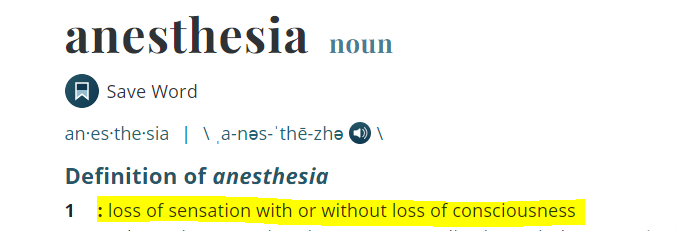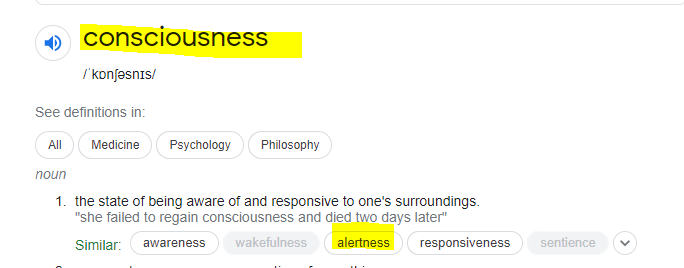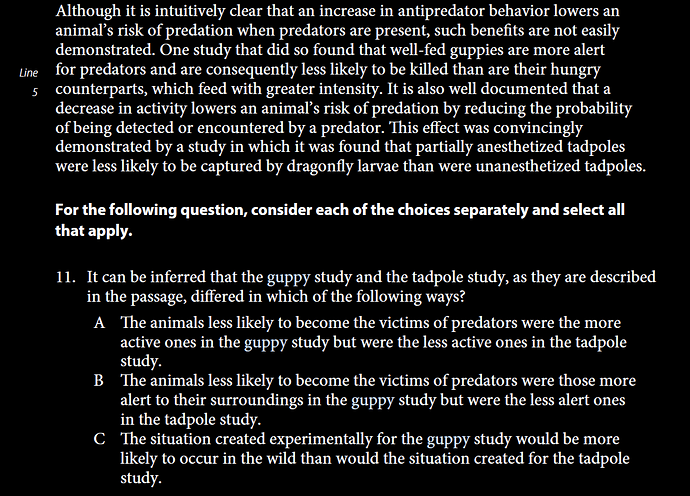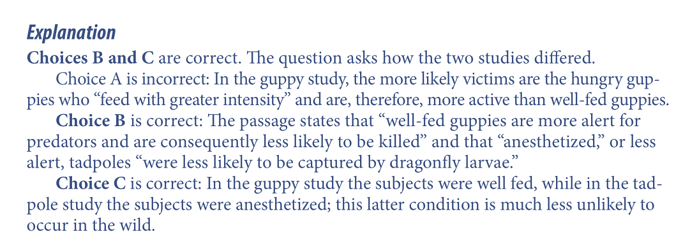In question 11 of Mixed Practice Set 1 of the Official Verbal 2nd Edition book:
C should be the only correct answer. I reason that option B, indicated as correct, is not substantiated by the text. Option B starts off correct: the animals less likely to be victims in the guppy study were indeed the more alert ones. However, the second part of B: that the less alert tadpoles were less likely to fall prey is not supported by any evidence. The alertness of tadpoles in not an idea touched upon in the passage: only their activity is. This option forces one to assume that alertness and activity are both decreased by “partial anaesthesia”, whereas the passage only states (or alludes) that partial anaesthesia affects activity . Alternatively, it forces one to assume that decreased activity equates to decreased alertness .
Indeed, alertness is not touched upon as an element in the tadpole study in any way; it is only indicated that the second study also pertains to predation risk but concerns itself with activity .
I cannot find any evidence in the passage to suggest equating reduced activity to reduced alertness, nor any rhetorical device that places the second study as a parallel to the first in such a way that alertness and activiy must also necessarily be parallels.
If anything, B would have been an excellent trap answer. Just because the anaesthesized tadpoles were less active does not mean they were less alert. It is entirely possible that the anaesthesized tadpoles were equally alert but had only their mobility affected. Only their mobility, ‘activity’ , being affected can be reasonably established. I believe drawing any equivalence, correlation or causal relationship between reduced activity and reduced alertness with the information, allusions and rhetoric available in the passage is faulty inference.
Am I missing something? What is your opinion?
Annex: Though it is besides the point, not all anaesthesia inhibit cognitive function. This is, however, not important, because even if it weren’t true, the test-taker should not be expected to exercise that external knowledge, divorced from the contents and allusions of the passage.
Evidence for option B
A is saying animals will die less if it were more active but this statement is contradicted by the 5 line in the passage “feed with great intensity = kill”, hence A is out
PS post the screenshot of the question and the choices next time!!
I have updated the post with the question and passage as per your suggestion.
The line you have highlighted only justifies the first part of statement B:
‘The animals less likely to become the victims of predators were those more alert to their surroundings in the guppy study…’
I agree that this is correct.
That is not what I have taken issue with. Let us look at the next part ‘…but were the less alert ones in the tadpole study.’
Why would the tadpoles be the ‘less alert ones’ in the tadpole study? Where is the evidence for this? It is only mentioned that the tadpoles were made less active, which is not the same as being less alert. There is nothing to suggest that anesthesia did anything except reduce mobility - which is not the same as alertness. This is where my contention lies; feel free to re-read my post with this in mind.
Partially anesthetized = less alertness


I disagree. As far as the passage is concerned, partially anesthesized = less active. Your inference introduces external knowledge.
Furthermore:
In the definition you provided, it is explicitly stated that loss of conciousness is optional. There is nothing in the passage that clarifies what kind of anesthesia this is and to what extent it works. You are assuming that this anesthesia affected consciousness. This is not established anywhere. What is established is partial anesthesia was used which affected activity and specifically activity.
And, if we are bringing in external knowledge: there exists anesthesia that can make organisms less active or mobile without affecting their cognitive function (consciousness, or alertness).
My contention remains.
I think you have made up your mind .
- Below, I have attached the official ETS explanation where they have directly linked less alertness to anesthetized but if have complains then you can directly call / mail ETS regarding it and I think they will happily answer your queries .
- ETS contact linkhttps://www.ets.org/gre/contact
That explanation was the first avenue I explored.
I am sorry if I came off as combative: you’re right, I have made up my mind for now unless someone can point out a flaw in the logic I have presented. Thank you for trying to help. I have sent an email to ETS.




